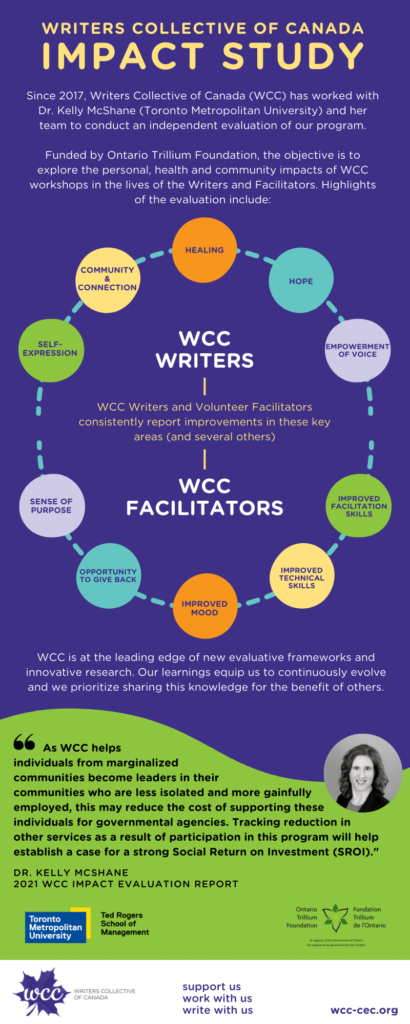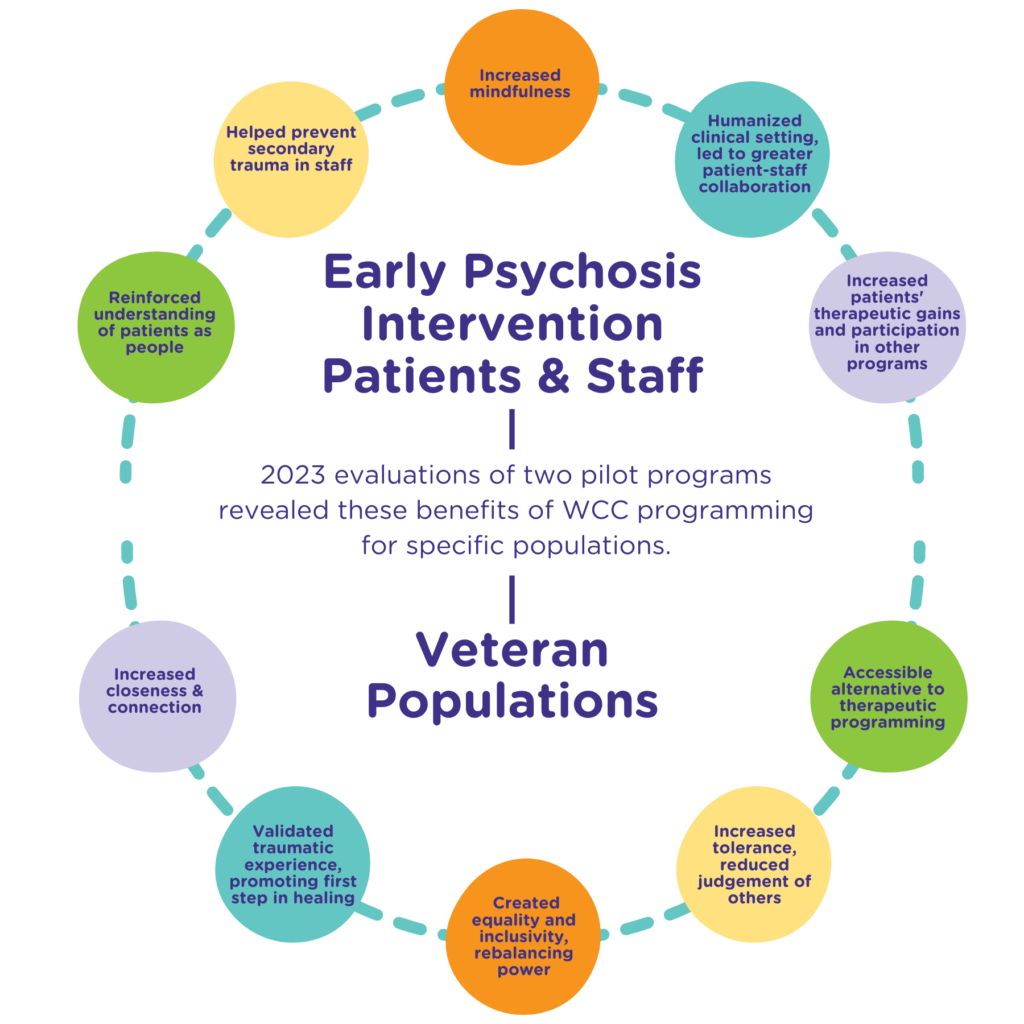PROVEN IMPACT STUDIES
Since 2017, Writers Collective of Canada (WCC) has worked with Dr. Kelly McShane and her team at Toronto Metropolitan University (TMU, formerly Ryerson University) to conduct an independent evaluation of our program.
Funded by Ontario Trillium Foundation, the objective is to explore the personal, health and community impacts of WCC workshops in the lives of WCC writers and facilitators.
Key Findings
Key findings of the study include:
Attendees of WCC workshops experience positive changes:
Positive change was documented in the areas of: hope, self-expression, well-being, resilience, creativity, empowerment, leadership, self-esteem, mood, sense of community, writing skills, connection, distress, and stress.
Attendees consistently report other improvements:
Including in the following areas: social isolation, self-expression, healing and recovery, self-worth, empowerment of voice, and resilience.
Facilitators of WCC workshops experience positive changes:
Facilitators reported positive change in the areas of: sense of purpose, career exploration, leadership, compassion, creativity, emotional intelligence, communication, sense of community, self-care self-efficacy, satisfaction, writing skills, and open-mindedness.
WCC facilitators consistently report other improvements:
Including in the following areas: satisfaction, sense of purpose, empathy, facilitation skills, listening skills, organizational skills, professional development, career development, and sense of accomplishment. In addition, 9 of the facilitators were originally participants in the workshop.
Both participant writers and volunteer facilitators report improvements in:
Well-being, sense of connection, confidence, and writing skills.
2023 population-specific impact evaluations
In 2023, WCC conducted evaluations of two pilot projects to gain insight into how WCC workshops benefit people in population-specific environments, including:*
- Patients and staff within a clinical mental health setting – Trillium Health Partners, Peel – Early Psychosis Intervention Program
- Veterans – Veteran’s House: The Andy Carswell Building, Ottawa, and Healing Unseen Wounds: Her Story, a virtual series for women who have served in the Canadian military
Our Program Theory was found to deliver consistent outcomes across the pilot programs and similar to those found in the multi-year studies.
Consistently Demonstrated Impacts
The 2023 program evaluations identified common impacts delivered by WCC’s Program Theory. These emerged consistently across a variety of settings, environments, and populations:
- Promotes a sense of safety among participants, leading to increased participation and benefit.
- Serves as a first step in healing and recovery by validating human experience and affirming individual identity.
- Promotes and models deep listening, allowing for authentic stories to be witnessed.
- Creates a sense of belonging and community that increases connection and decreases loneliness.
- Increases individuals’ capacity to engage in social interactions and reduces judgement of others in life outside of the program.
- Balances power dynamics among participants, including between Facilitators and Writers; among participants from traditionally hierarchical workplace or social environments; and between patients and staff.
Specific Outcomes: Clinical Setting
Within clinical settings supporting patient/client mental health, the WCC program proved beneficial to the degree that physicians began referring patients to the program (known as “social prescriptions”). Documented outcomes include benefits to patients and to staff.
Benefits to patients/clients:
- Therapeutic gains
- Humanization of the clinical setting and greater collaboration between patients and staff
- Increased engagement by patients in other programs
Benefits to staff/counsellors:
- Reinforced understanding of patients as people
- Prevention of secondary trauma in staff
- Increased mindfulness
Specific Outcomes: Veterans and Military Families
Within the community of veterans and their families, the pilot project was delivered in the context of helping these populations develop new skills to navigate their way from trauma to recovery and transition to post-service life. The program provided these specific benefits:
- A positive alternative to therapy, particularly for those who had been rejected from traditional therapeutic programs.
- Validation of traumatic experience and greater sense of connection in sharing those experiences.
- Effective stress management for staff.
- A greater sense of support and access due to elimination of hierarchical structure.
* Research generously funded by: Ontario Trillium Foundation, True Patriot Love Foundation, and Royal Canadian Legion – Ontario Command.
Sharing our knowledge
WCC is at the leading edge of new evaluative frameworks and innovative research. Our learnings equip us to continuously evolve and we prioritize sharing this knowledge for the benefit of others.
For more information on our research, or to invite us to present at your conference or meeting, please get in touch at contact@wcc-cec.org.


